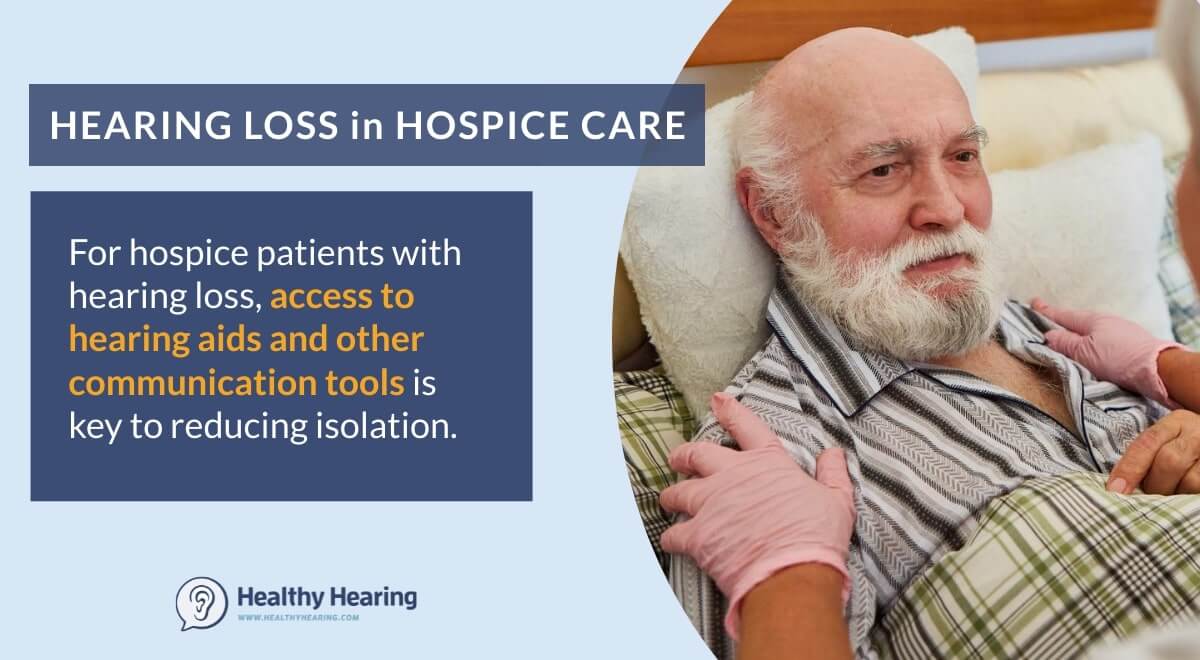|
www.HealthyHearing.com |
Hearing loss and hospice care: What to know
Contributed by Joy Victory, managing editor, Healthy Hearing Knowing your loved one is near the end of life and can't hear other people is a distressing thought. Unfortunately, hospice patients with hearing loss are sometimes in this predicament. However, there are steps you can take to reduce the burden of hearing loss on your loved one. In doing so, you help reduce their isolation and improve their ability to communicate with those around them. Most importantly:
Other communication tips for hospice care
Hearing loss is common in hospice patientsWhile hearing loss can happen at any age, it's common in older adults. Additionally, cancer patients can lose hearing due to certain types of chemotherapy. Other ototoxic medications used for end-of-life care can affect hearing and balance as well. The issue isn't lost on hospice staff, either. A national survey of hospice and palliative care providers found that 91% of respondents believed that hearing loss impacts the quality of care for older adults. An additional 88% said that they recalled a situation where hearing loss made it harder to communicate with a patient. Providing comfort is priorityThe main goal of hospice care is to provide comfort to patients. Communication is an essential part of this. A patient needs to have a good understanding of the medical care being provided, especially pain management options. This is not only for safety reasons but also for them to feel a sense of control over their final stages of life. Hearing is one of the last senses a person loses before death, according to the Hospice Foundation of America. Clear communication with caregivers and loved ones fosters connection, easing the loneliness of a patient's final days. It empowers them, nurturing emotional well-being and a sense of autonomy. “Hospice care is based on [the patient’s] need and comfort,” said Deb Athans, a grief counselor at Hospice of Cincinnati. “When you can’t communicate effectively, that is what is sacrificed.”
Have those important last conversationsHospice patients with hearing loss don't need to feel lonely and isolated. Hearing aids and other treatments allow them to participate in decisions regarding their final days and connect with their family and loved ones. Proper hearing care can enable those with hearing loss to be active participants in their own lives for as long as possible. Most importantly, no longer will hearing loss cause things to be left unsaid or unspoken between family members and their loved ones. “It is so important to have those last conversations with family,” Athans said. Joy Victory, managing editor, Healthy Hearing
|
Featured clinics near me
Earzlink Hearing Care - Reynoldsburg
7668 Slate Ridge Blvd
Reynoldsburg, OH 43068

Find a clinic
We have more hearing clinic reviews than any other site!



 Joy Victory has extensive experience editing consumer health information. Her training in particular has focused on how to best communicate evidence-based medical guidelines and clinical trial results to the public. She strives to make health content accurate, accessible and engaging to the public.
Joy Victory has extensive experience editing consumer health information. Her training in particular has focused on how to best communicate evidence-based medical guidelines and clinical trial results to the public. She strives to make health content accurate, accessible and engaging to the public.